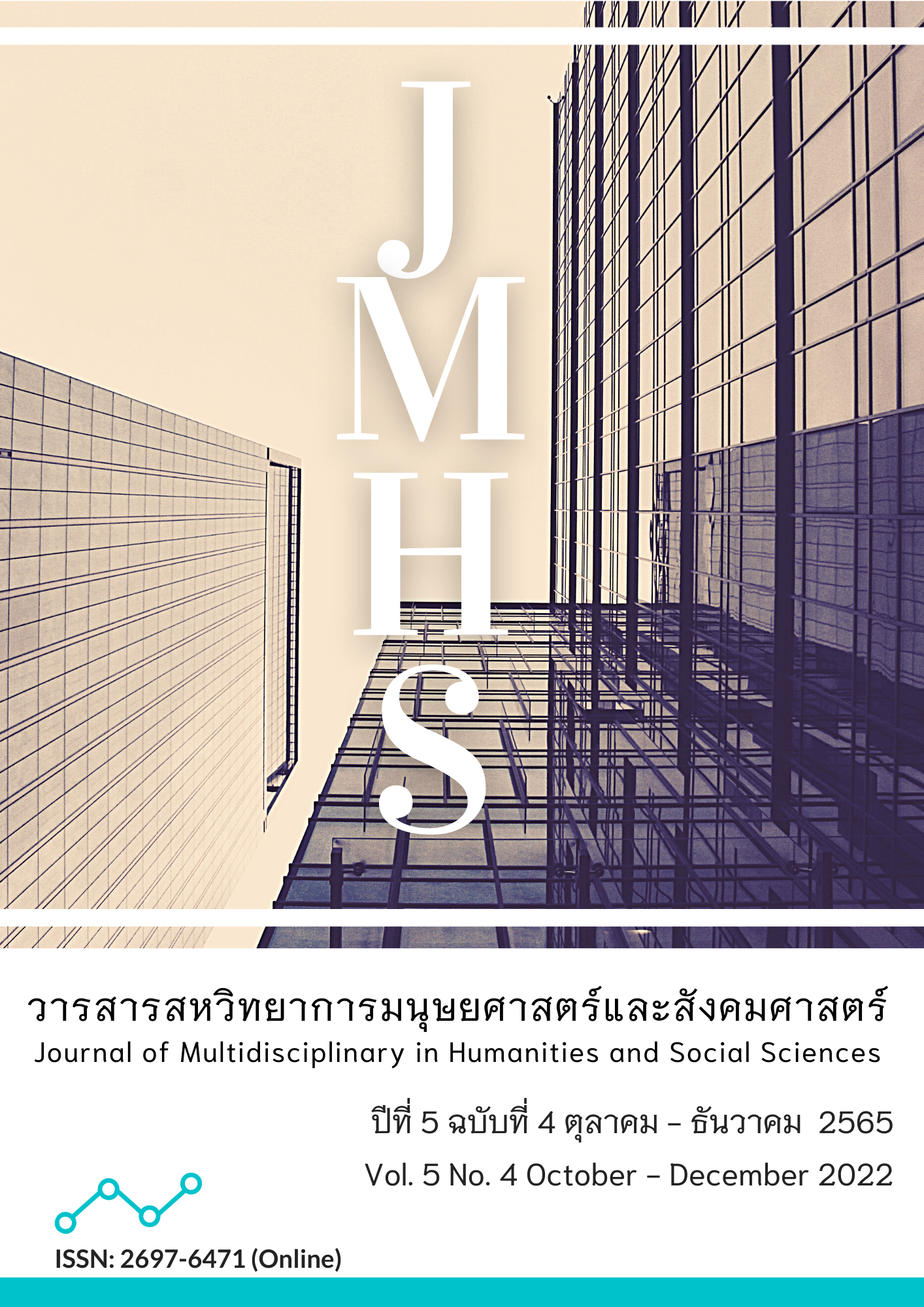THe Organization Development Methods in Principle Aparihaniyadhammao of Phandintham Phandinthong Center Sana District, Phra Nakhon Si Ayutthaya Province
Main Article Content
Abstract
This article aimed (1) to study the concepts and theories of organizational development and human resource development problems; (2) to study the development of organizations according to the principles of morality 7; and (3) to propose methods of organizational development according to the principle of morality. This research was qualitative research by studying data from documents and gathering data from in-depth interviews, analyzing content data in a descriptive manner. The results of the research revealed that 1) human resource management has important scope and steps, namely the characteristics of human resources, organizational formatting, external and internal environments, processes of development, training, development and maintenance of resources, human resource planning, recruitment, selecting, recruiting, appointing, orientation and inter-operation training, etc. 2) Organizational development according to the principles of morality, consisting of (1) regular meetings; (2) concurrent meetings; (3) not enacting or not abolishing the ordinance arbitrarily; (4) respecting superiors; (5) respecting and protecting women's rights; (6) promoting and preserving cultural traditions good; and (7) protection from dangers; 3) guidelines for the administration of the Golden Land Dharma Land Center. It was found that there should be a personnel management plan in the organization specifying the workload, scope, and position clearly applying the principles of morality 7 to integrate them to make them suitable for work, such as 1) training and development 2) setting up rules and regulations 3) organizing personnel have direct knowledge of the position and the ability to meet the goals and objectives of the organization, etc., for new ideas in operations to create knowledge that is up to date.
Article Details

This work is licensed under a Creative Commons Attribution-NonCommercial-NoDerivatives 4.0 International License.
Views and opinions appearing in the Journal it is the responsibility of the author of the article, and does not constitute the view and responsibility of the editorial team.
References
ไชยะ เทพา. (2564). ภาวะผู้นำทางการเมืองในยุคโควิด-19. วารสารสหวิทยาการมนุษยศาสตร์และสังคมศาสตร์, 4(3), 1027-1044. สืบค้นจาก https://so04.tci-thaijo.org/index.php/jmhs1_s/ article/view/255442
ถวิล เกื้อกุลวงศ์. (2528). การจูงใจเพื่อผลงาน. กรุงเทพฯ: มหาวิทยาลัยศิลปากร.
ธงชัย สันติวงษ์. (2535). องค์การและการบริหาร. (พิมพ์ครั้งที่ 7). กรุงเทพฯ: ไทยวัฒนาพานิช.
พระครูปลัดไพฑูรย์ เมธิโก. (2558). อปริหานิยธรรม : สันติภาพสู่สังคมไทย. กระแสวัฒนธรรม, 16(29), 73-82. สืบค้นจาก https://so02.tci-thaijo.org/index.php/cultural_approach/article/view/35498
พระพรหมคุณาภรณ์ (ป.อ. ปยุตโต). (2550). ธรรมนูญชีวิต. กรุงเทพฯ: สํานักพิมพ์จันทร์เพ็ญ.
พระมหานรินทร์ สุรปญฺโญ. (2564). พระพุทธศาสนากับการพัฒนาผู้นำ. วารสารธรรมวัตร, 2(2), 19-28.
พระสมชาย บัวแก้ว, พระมหาบุญศรี วงค์แก้ว และ สุเชาวน์ พลอยชุม. (2564). อภิสมาจาร: กระบวนการพัฒนาบุคลิกภาพตามแนวพระพุทธศาสนา. วารสารศิลปการจัดการ, 5(3), 895-907. สืบค้นจาก https://so02.tci-thaijo.org/index.php/jam/article/view/251384
พระสมหมาย อตฺถสิทฺโธ. (2559). รูปแบบการนำหลักอปริหานิยธรรมไปใช้ในการบริหารของผู้บริหาร สังกัดองค์การปกครองส่วนท้องถิ่น จังหวัดร้อยเอ็ด. วารสารวิชาการธรรมทรรศน์, 16(1), 101-113. สืบค้นจาก https://so06.tci-thaijo.org/index.php/dhammathas/article/view/78758
เพ็ญศรี วายวานนท์. (2538). การจัดการทรัพยากรคน. (พิมพ์ครั้งที่ 3). กรุงเทพฯ: ปิ่นเกล้าการพิมพ์.
มหาจุฬาลงกรณราชวิทยาลัย. (2539). พระไตรปิฎกภาษาไทยฉบับมหาจุฬาลงกรณราชวิทยาลัย. กรุงเทพฯ: โรงพิมพ์มหาจุฬาลงกรณราชวิทยาลัย.
วศิน อินทสระ. (2544). หลักธรรมอันเป็นหัวใจของพระพุทธศาสนา. กรุงเทพฯ: ธรรมดาการพิมพ์.
วิไลลักษณ์ ยางงาม, ฐนันวริน โฆษิตคณิน และ ชนิดาภา ดีสุขอนันต์. (2565). การจัดการภายในองค์กรที่ส่งผลต่อแรงจูงใจในการทำงานของพนักงานในนิคมอุตสาหกรรมบางปู จังหวัดสมุทรปราการ. วารสารสหวิทยาการมนุษยศาสตร์และสังคมศาสตร์, 5(1), 36-49. สืบค้นจาก https://so04.tci-thaijo.org/index.php/jmhs1_s/article/view/255442
สมยศ นาวีการ. (2538). การบริหารทรัพยากรมนุษย์. กรุงเทพฯ: สำนักพิมพ์ผู้จัดการ.
Damnoen, P. S., Siri, P., Supattho, P. S., & Kaewwilai, K. (2021). The Development of Student Characteristics in According to the Nawaluk Framework of the Buddhist integration of Buddhapanya Sri Thawarawadee Buddhist College. Asia Pacific Journal of Religions and Cultures, 5(2), 126–135. Retrieved from https://so06.tci-thaijo.org/index.php/ajrc/article/view/249662
Jantaratim , K., Wongsuwan, K. , Pachimsawat, K. , & Peammatta, J. (2021). Public Opinion Survey on the Government’s Economic Policy of the NCPO. International Journal of Multidisciplinary in Management and Tourism, 5(1), 29–35. https://doi.org/10.14456/ijmmt.2021.4
Tan, C. C., & Damnoen, P. S. (2020). Buddhist Noble Eightfold Path Approach in the Study of Consumer and Organizational Behaviors. Journal of MCU Peace Studies, 8(1), 1–20. Retrieved from https://so03.tci-thaijo.org/index.php/journal-peace/article/view/235080


